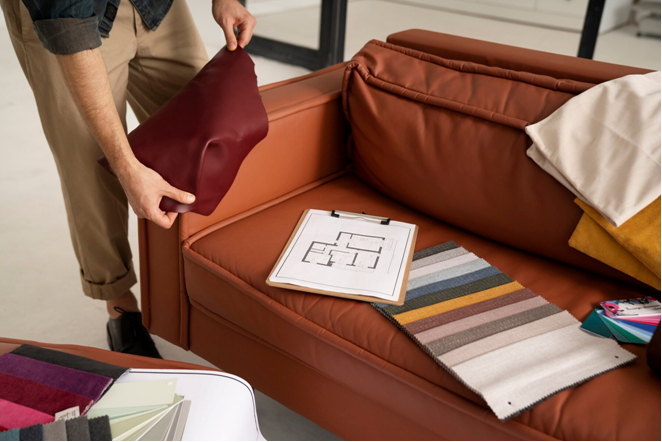5 Key Elements of Contemporary Interior Design
In the ever-evolving world of interior design,
contemporary style continues to captivate homeowners and designers alike with
its sleek, sophisticated, and minimalist approach. Whether you're redesigning
your living room or planning a complete home makeover, understanding the key
elements of contemporary interior design is crucial. In this article, we'll
explore the five essential components that define this popular style, touching
on variations like contemporary Indian interior design and contemporary
European interior design.
1. Clean Lines and Minimalism
At the heart of contemporary style interior design lies
a commitment to clean lines and minimalism. This approach emphasizes simplicity
and understated elegance, creating spaces that feel open, uncluttered, and
purposeful. In contemporary house interior design, you'll often find:
- Straight lines in furniture and architecture
- Minimal ornamentation
- Uncluttered spaces with a focus on
functionality
The living room contemporary interior
design often showcases this principle beautifully, with streamlined sofas,
simple coffee tables, and clutter-free surfaces that allow the eye to rest and
the space to breathe.
2. Neutral Color Palette with Bold
Accents
Contemporary interior design typically employs a neutral
color palette as its foundation. Whites, beiges, grays, and blacks dominate the
space, creating a calm and sophisticated atmosphere. However, this neutral base
is often punctuated with bold, vibrant accents that add personality and visual
interest to the room.
In contemporary Indian interior design, you might see
rich jewel tones like deep purples, emerald greens, or vibrant oranges used as
accents against a neutral backdrop, reflecting the country's colorful cultural
heritage while maintaining a modern aesthetic.
3. Emphasis on Natural Light and
Open Spaces
Contemporary design places a strong emphasis on natural
light and open floor plans. Large windows, often unadorned or minimally
dressed, allow sunlight to flood the space, creating an airy and inviting
atmosphere. This focus on light and openness is particularly evident in
contemporary European interior design, where historic buildings are often reimagined
with modern, light-filled interiors.
To maximize the feeling of openness, contemporary
designers often:
- Remove unnecessary walls to create
open-concept living areas
- Use glass partitions instead of solid walls
when separation is needed
- Incorporate skylights or clerestory windows
to bring light into interior spaces
4. Mix of Textures and Materials
While contemporary design favors simplicity, it doesn't
shy away from incorporating a variety of textures and materials. This mix adds
depth and interest to the space without cluttering it visually. Common
materials in contemporary interiors include:
- Smooth metals like stainless steel or chrome
- Natural wood, often with a matte finish
- Glass, used in furniture, room dividers, or
as architectural elements
- Natural stone, such as marble or slate
- Textured fabrics for upholstery and soft
furnishings
The contrast of these materials – for example, a sleek
metal coffee table atop a plush area rug – creates visual and tactile contrast
that elevates the overall design.
5. Statement Lighting and Artwork
In contemporary interior design, lighting and artwork
are not merely functional or decorative elements – they are focal points that
can define the entire space. Oversized pendant lights, sculptural floor lamps,
or striking chandeliers often serve as artistic statements in their own right.
Similarly, carefully chosen artwork plays a crucial role
in contemporary spaces. Large-scale paintings, photography, or sculptures are
frequently used to add color, texture, and personality to otherwise minimalist
rooms. In contemporary Indian interior design, you might find modern
interpretations of traditional art forms or contemporary pieces inspired by
India's rich cultural heritage.
Bringing Contemporary Design to
Your Space
If you're inspired to incorporate contemporary interior
design into your home or office, consider seeking professional guidance. The benefits
of interior design consulting services are numerous, from access to expert
knowledge and resources to ensuring a cohesive and polished final result. For
those looking to dive deeper into this style, our comprehensive guide on everything
you need to know about contemporary interior design offers valuable
insights and practical tips.
At KreativEdge Interiors, we specialize in bringing
contemporary design principles to life in homes, offices, and commercial spaces
across India. Based in Pune and serving clients in Mumbai and beyond, our team
of experienced designers combines global contemporary trends with local
sensibilities to create spaces that are both stylish and functional. Whether
you're looking to refresh your living room or undertake a complete interior
overhaul, KreativEdge Interiors has the expertise to transform your vision into
reality. Contact us for interior
design services.
In conclusion, contemporary interior design offers a
timeless approach to creating spaces that are both beautiful and livable. By
focusing on clean lines, a thoughtful color palette, natural light, mixed
materials, and statement pieces, you can achieve a contemporary look that
reflects your personal style and enhances your daily life. Whether you're drawn
to the sleek minimalism of contemporary European interiors or the vibrant
accents of contemporary Indian design, the principles of contemporary style
offer endless possibilities for creating spaces that are truly your own.
Source: https://kreativedgeinteriors.com/5-key-elements-of-contemporary-interior-design/



Comments